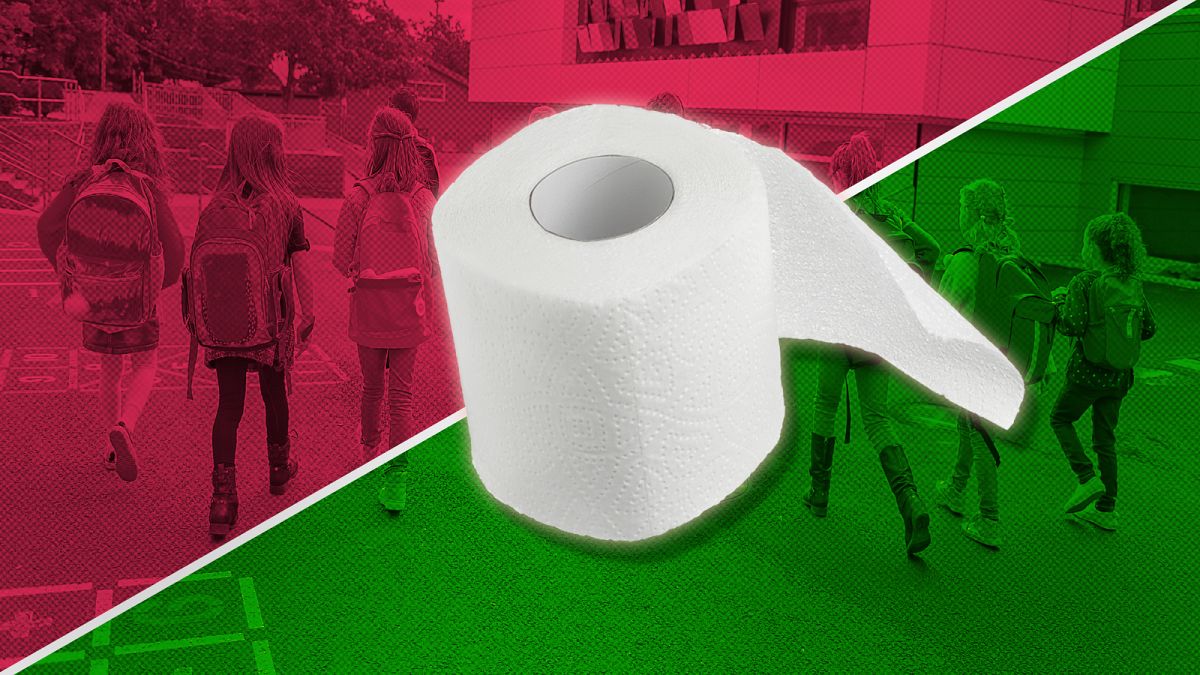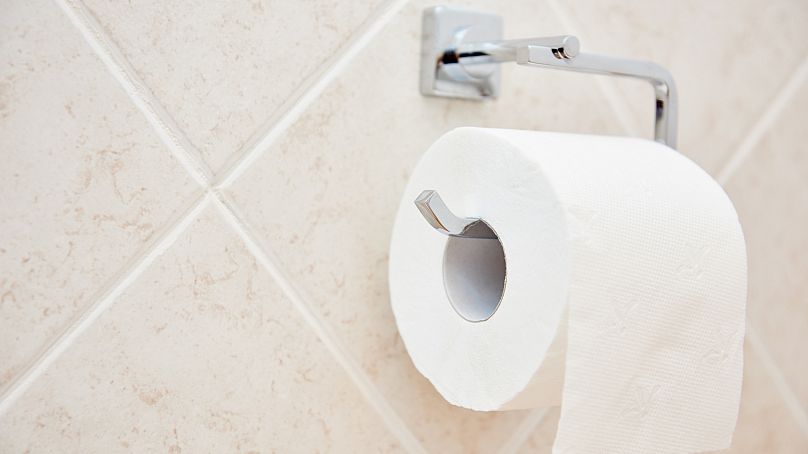From toilet paper to soap, Italian schools often fail to provide basic supplies to their students. Instead, parents are often asked for significant contributions to help with funding.
In many schools across Italy, students heading to the toilets know there’s one thing they should not forget to bring: their own toilet paper, because they likely won't find any when they get to the cubicles.
On TikTok, Italian high schoolers joke about the widespread lack of toilet paper in many schools, celebrating the appearance of a solitary roll as a “once in a blue moon” event.
Other pupils speak of having to ask the janitor for toilet paper every time they head to the toilets and being allocated just a few sheets, instead of the entire roll.
In a video on the app, two high school students are asked about what’s wrong with the country’s school system. “The infrastructure is old and falling apart, there’s often no soap in the toilets, there’s no toilet paper,” one girl says. “That’s always the case,” the high schooler who’s interviewing her replies.
Another Italian TikToker shares with his peers the rights of students schools often fail to respect, including having the right to find soap and toilet paper in the toilets and having heating in the classrooms in winter. Radiators are often switched off or broken in Italian schools, leading to the occasional student strike during winter.
“Are there really people with toilet paper and soap in the toilets? I didn’t even have it in primary school,” one user said. “In my school soap is a legend,” another responds.
There was a brief moment, in 2016, when this decades-long problem was revealed to the rest of the world as outraged British newspapers wrote that an Italian primary school had asked children to bring their own toilet roll due to a lack of funding.
In Italy, this revelation wasn’t headline news at all, but a problem that has affected generations of students.
In 2017, Cittadinanzattiva - a nonprofit promoting citizens’ rights in Italy - reported that 47% of schools across the country lacked toilet paper, and 64% lacked soap.
The problem has not gone away since. Earlier this year, 277 parents in the city of Ferrara signed a petition asking the local school management to provide toilet paper in the city’s primary schools.
Why are Italy’s schools lacking bare essentials?
“Italy doesn’t invest much in education, in fact, it spends much less on it than other European countries,” Adriana Bizzarri of Cittadinanzattiva told Euronews.
“This year the country’s spending on the public education sector was €7,000 per student in kindergarten and primary school and up to €9,000 per student in high school. In other European countries the average expense is €10,000 per student,” she added.
The country is now expected to spend part of the huge €191.5 billion EU COVID recovery fund on the education sector.
“But we’ll only see these results in 2026,” said Bizzarri, “and part of this money is going to be spent fixing maintenance work on old infrastructure.”
Not all schools are the same
While the Italian education sector is generally underfunded, there are schools that are not struggling as much as others, and can easily provide the bare essentials to their students.
That’s because the Italian school system promotes the autonomy of each institute and its management, with the state granting funds according to how many students, professors, and staff members each school has.
While this autonomy can be good, Bizzarri said, it also allows for situations where struggling schools have to resort to asking parents for help to fund the school.
At the beginning of the school year, in September or October, schools can ask for a voluntary contribution from parents, a one-time payment whose sum can vary from school to school and is not regulated at a state level.
This money should help schools offer better services to their students. While it’s not mandatory, there’s often a lot of social pressure on parents to help out.
“There’s not an official price list,” Bizzarri said. “There are primary schools who ask for €30, while middle schools can ask between €50 and €50. In high school this voluntary contribution can be between €100 and €180,” she continued.
“These contributions can be significant, especially considering that in Italy school is free for students up to 16 years old.”
But the result of this “voluntary contribution” system is a deepening divide between wealthier and poorer schools, with the first benefitting from the more generous contributions of higher-income parents.
While schools don’t ask parents for money to buy toilet paper, in primary school they ask for funds to buy textbooks, pencils, drawing books, and so on.”
A primary school teacher in Sardinia told Euronews that teachers often spend their own money to buy supplies for their students. Italian school teachers are among the lowest paid in the EU.
A glimmer of hope
Adriana Bizzarri of Cittadinanzattiva said that the situation has appeared to improve after the COVID pandemic, with schools across the country putting more focus on hygiene - cleaning more, and even regularly buying toilet paper.
“For years our organisation has fought for schools to have soap and toilet paper,” she said. “And what we’ve found after the pandemic is that schools are paying more attention and are no longer asking families to buy toilet paper.”
“Now we wait and see how long this will last."

